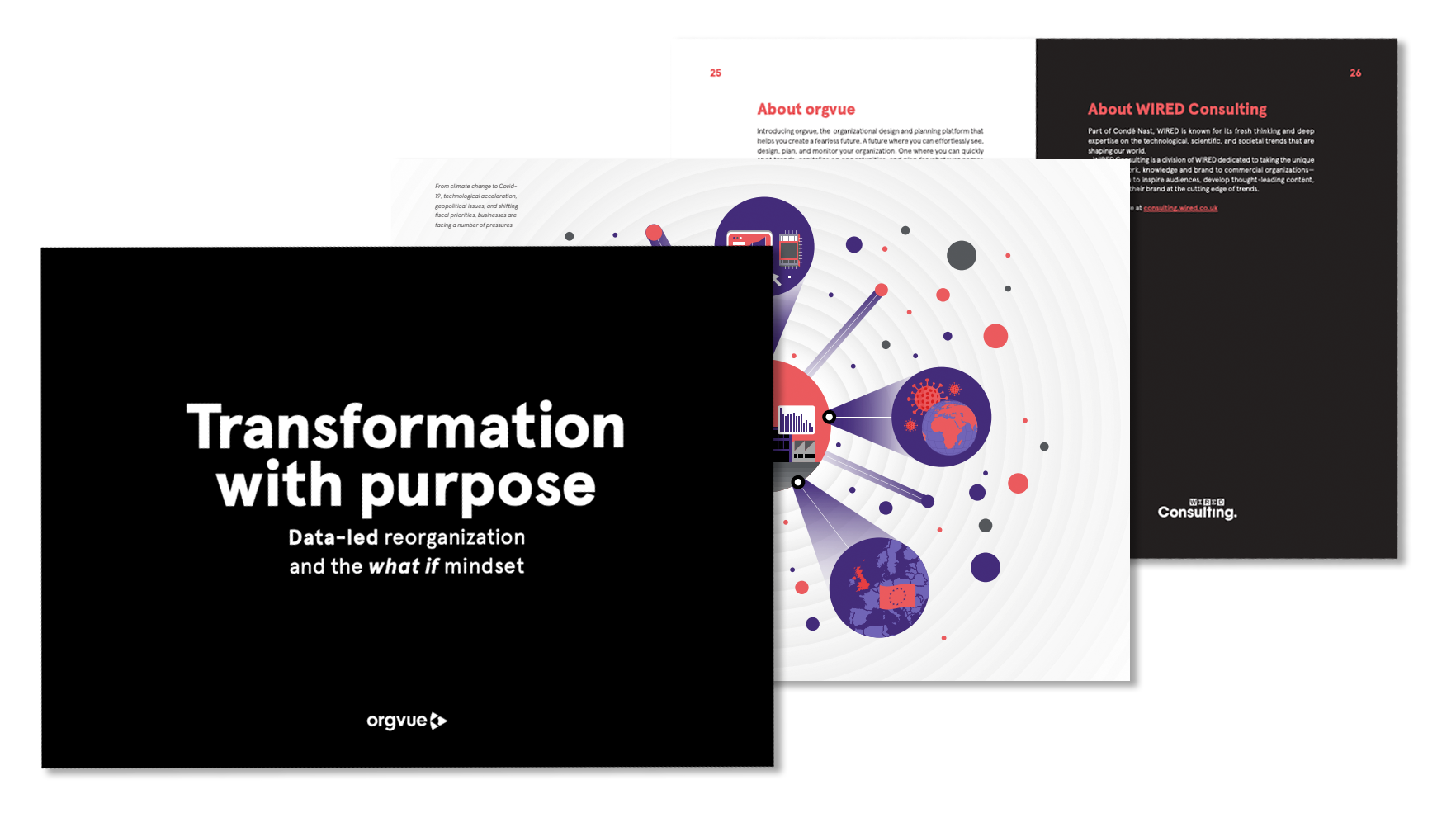Transformation with purpose
Introducing our major new study with WIRED Consulting.
Home > Resources > ebook > Transformation with purpose

Expert after expert talks about how businesses need to adapt to the new normal, but they’re missing the point. There is no normal or new normal – the world of business is ever-changing and evolving. If you only ever seek to respond to what’s already happened you’ll fall further behind.
The future of business is about being proactive – responding to changes in real time through data-led decision making, rather than instituting a wait and see approach where data is only ever used reactively.
This change in mindset won’t come easily – which is why we’ve partnered with WIRED Consulting to create Transformation with purpose: data-led reorganization and the “what if” mindset – a comprehensive guide to the key challenges facing businesses and the actions you can take to help ride the wave.
Why WIRED? Well so many of these changes are being driven by technological changes, and crucially the solutions come from technology too. So we could think of no better partner to work with than a media organization who has been impartially chronicling and commenting on the role tech plays in business and society for nearly 30 years.
The key challenges facing organizations
Most businesses struggle to see the wood for the trees. They make so many individual little changes every day, that they lose sight of the major change decisions they need to face and the impact these will have on their businesses. But, this doesn’t mean those changes don’t happen – quite the opposite, it just means they’re not in control of them. Working with Wired, we’ve identified six major challenges that are consistent across businesses.
- Growth and complexity come hand in hand – larger businesses find it impossible to keep their processes simple and consistent across departments and locations
- Businesses get stuck in reorganization loops – the sheer time it takes to implement large scale changes means that by the time a restructure is complete, there’s an urgent need to do it all over again
- A lack of tools and technology – businesses are relying on outdated tech stacks and datasets – making it hard to make decisions in real time and making leaders wary of dramatic change
- Theory doesn’t equal reality – classic models of organizations are too rigid to reflect the realities of modern business and mean key opportunities can be hidden or neglected
- A data deficit – most business leaders simply don’t have access to the right data at the right time – meaning they make decisions on instinct rather than acting from an informed position
- A confused workforce – talent thrives when it understands its purpose – but at most businesses workforces are confused about how their role fits into the bigger picture
The keys to a fresh approach
The good news – none of these challenges are insurmountable. We’ve identified six key features that a business which is in control of change, rather than governed by it have in common:
- A fluid mindset – if you’re not willing to change, you’ll never stay ahead – businesses have to be willing to act in real time
- A dynamic approach – the organizations who will triumph are the ones who accept that change is a continuous process, rather than something to be scheduled
- Smarter use of data – by bringing data from different departments together, businesses can get a true understanding of their key opportunities and challenges
- Refreshing HR’s role – HR shouldn’t just support a business from an operational perspective – it has a key role to play in developing and driving strategy
- Ready for anything – no one can be certain of the future – the smartest businesses are flexible enough to not only ask ‘what if’, but are able to respond to it too
- Open to new tools – old tools can’t solve new challenges – businesses need to invest in bespoke solutions which can keep up with the pace of change
Why you should care
The final section of the ebook explores what a positive future looks like for business and reaches a compelling conclusion. While businesses can never prevent change from happening, they can take control over how that change impacts them. By using data to inform organizational decisions in real time, businesses can move away from a boom and bust cycle of change and adopt a more fluid approach.
For this to happen – businesses need to understand that however much data they have – their workforce can never be viewed purely through the lens of statistics. There’s an absolute moral importance to viewing them as humans in their own right and remembering that change will always have an emotional impact that can’t be quantified by data alone. Only by combining data and humanity can businesses take control of their own future and move away from change being forced upon them.
Ready to learn what it takes to shape your own destiny? Download Transformation with purpose: data-led reorganization and the “what if” mindset today.
